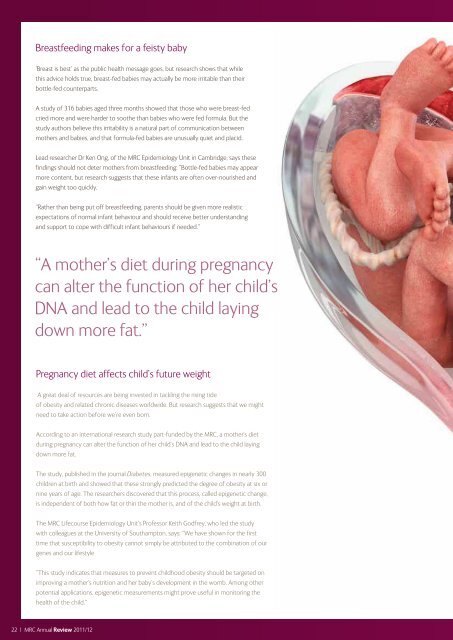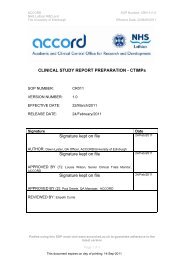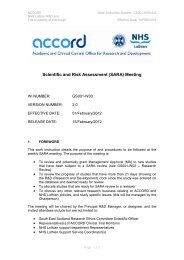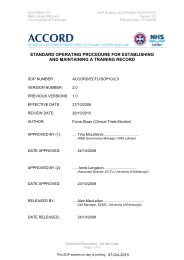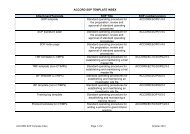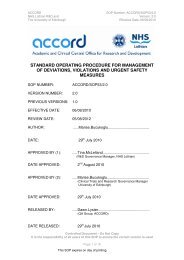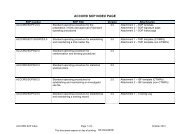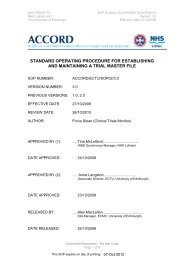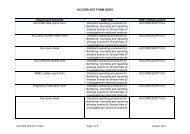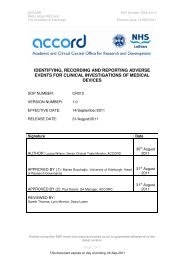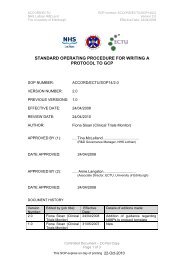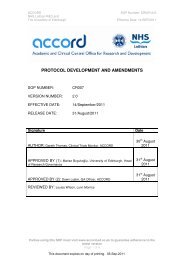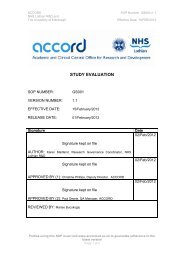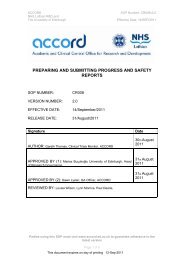Advancing medicine, changing lives - Medical Research Council
Advancing medicine, changing lives - Medical Research Council
Advancing medicine, changing lives - Medical Research Council
Create successful ePaper yourself
Turn your PDF publications into a flip-book with our unique Google optimized e-Paper software.
Breastfeeding makes for a feisty baby<br />
‘Breast is best’ as the public health message goes, but research shows that while<br />
this advice holds true, breast-fed babies may actually be more irritable than their<br />
bottle-fed counterparts.<br />
A study of 316 babies aged three months showed that those who were breast-fed<br />
cried more and were harder to soothe than babies who were fed formula. But the<br />
study authors believe this irritability is a natural part of communication between<br />
mothers and babies, and that formula-fed babies are unusually quiet and placid.<br />
Lead researcher Dr Ken Ong, of the MRC Epidemiology Unit in Cambridge, says these<br />
findings should not deter mothers from breastfeeding: “Bottle-fed babies may appear<br />
more content, but research suggests that these infants are often over-nourished and<br />
gain weight too quickly.<br />
“Rather than being put off breastfeeding, parents should be given more realistic<br />
expectations of normal infant behaviour and should receive better understanding<br />
and support to cope with difficult infant behaviours if needed.”<br />
“A mother’s diet during pregnancy<br />
can alter the function of her child’s<br />
DNA and lead to the child laying<br />
down more fat.”<br />
Pregnancy diet affects child’s future weight<br />
A great deal of resources are being invested in tackling the rising tide<br />
of obesity and related chronic diseases worldwide. But research suggests that we might<br />
need to take action before we’re even born.<br />
According to an international research study part-funded by the MRC, a mother’s diet<br />
during pregnancy can alter the function of her child’s DNA and lead to the child laying<br />
down more fat.<br />
The study, published in the journal Diabetes, measured epigenetic changes in nearly 300<br />
children at birth and showed that these strongly predicted the degree of obesity at six or<br />
nine years of age. The researchers discovered that this process, called epigenetic change,<br />
is independent of both how fat or thin the mother is, and of the child’s weight at birth.<br />
The MRC Lifecourse Epidemiology Unit’s Professor Keith Godfrey, who led the study<br />
with colleagues at the University of Southampton, says: “We have shown for the first<br />
time that susceptibility to obesity cannot simply be attributed to the combination of our<br />
genes and our lifestyle<br />
“This study indicates that measures to prevent childhood obesity should be targeted on<br />
improving a mother’s nutrition and her baby’s development in the womb. Among other<br />
potential applications, epigenetic measurements might prove useful in monitoring the<br />
health of the child.”<br />
Itinerant childhood, unhealthy adulthood<br />
Moving house frequently as a child makes you more likely to suffer poor health in<br />
adulthood, research suggests.<br />
A study funded by the MRC and the Scottish Government tracked 850 people over 20<br />
years to see if there was an association between moving house from birth to age 18 on<br />
physical health, psychological distress, and health behaviours such as smoking, heavy<br />
drinking and illegal drug use.<br />
At age 18, those participants who had moved at least once were more likely to have<br />
reduced overall health. Compared with those who stayed in the same house, the most<br />
frequent movers – those who had moved at least three times before age 18 – were twice<br />
as likely to have used illegal drugs and nearly three times as likely to have had suicidal<br />
thoughts. However, some of these negative health outcomes were reduced by the time<br />
the participants reached age 36. The results were independent of the participants’<br />
social background.<br />
The research was led by Dr Denise Brown, of the MRC/CSO Social and Public Health<br />
Sciences Unit in Glasgow. She said: “This research suggests that support should be<br />
given to children during a family relocation to ensure that important social ties and<br />
relationships with healthcare professionals are not broken.”<br />
“Bottle-fed babies<br />
may appear more<br />
content, but<br />
research suggests<br />
that these infants<br />
are often overnourished<br />
and<br />
gain weight too<br />
quickly.”<br />
22 | MRC Annual Review 2011/12 MRC Annual Review 2011/12 | 23


